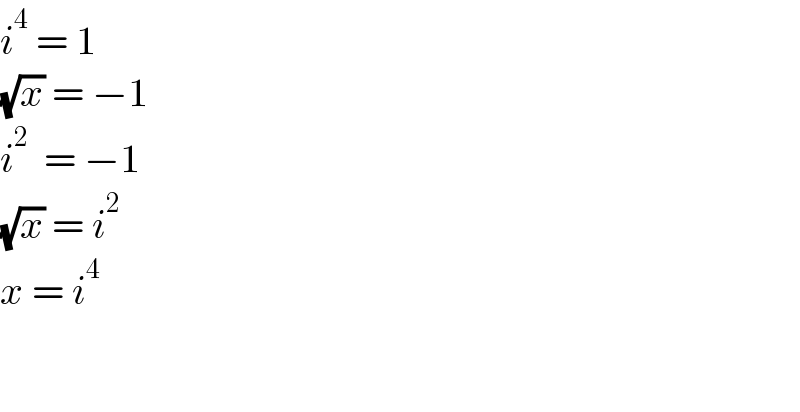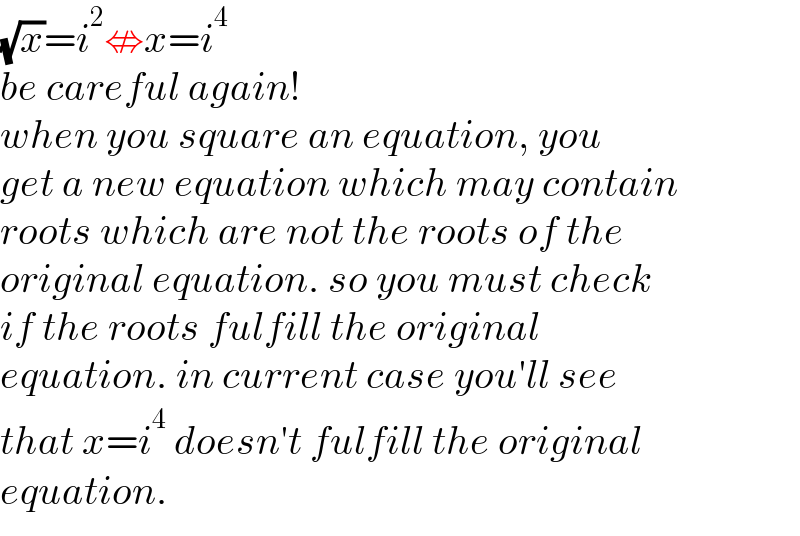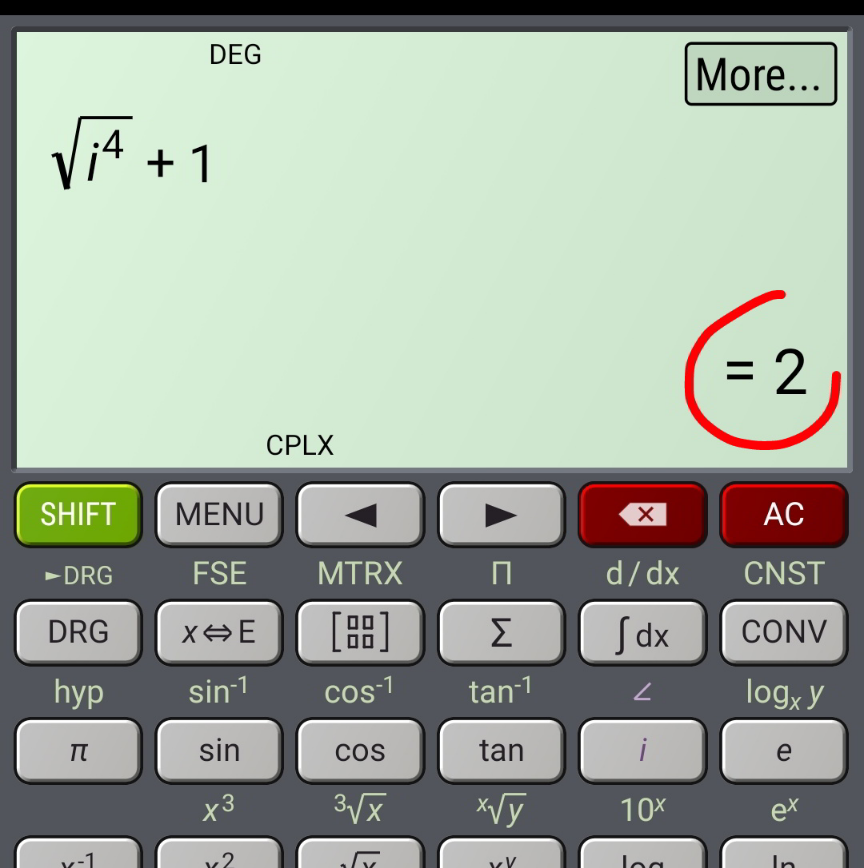Question Number 169396 by Mastermind last updated on 29/Apr/22

$$\sqrt{{x}}+\mathrm{1}=\mathrm{0} \\ $$$${find}\:{x} \\ $$$$ \\ $$$${Mastermind} \\ $$
Commented by mr W last updated on 29/Apr/22

$${i}^{\mathrm{4}} =\mathrm{1} \\ $$$$\sqrt{{i}^{\mathrm{4}} }+\mathrm{1}=\mathrm{2}\neq\mathrm{0} \\ $$
Commented by infinityaction last updated on 29/Apr/22

$${i}^{\mathrm{4}} \:{where}\:{i}\:{is}\:{a}\:{complex}\:{number} \\ $$
Commented by mr W last updated on 29/Apr/22

$$\sqrt{{x}}+\mathrm{1}=\mathrm{0}\:{has}\:{no}\:{solution}\:{even}\:{for} \\ $$$${x}\in\mathbb{C}. \\ $$
Commented by Mastermind last updated on 29/Apr/22

$${Wow}! \\ $$$${thanks}\:{man} \\ $$
Commented by Mastermind last updated on 29/Apr/22

$${i}\:{love}\:{the}\:{way}\:{you}\:{answered}\:{it} \\ $$
Commented by Mastermind last updated on 29/Apr/22

$${Thank}\:{you}\:{too},\:{for}\:{attempting}\:{it} \\ $$
Commented by Mastermind last updated on 29/Apr/22

$${But}\:{why}\:{didn}'{t}\:{you}\:{consider}\:{law}\:{of} \\ $$$${exponential} \\ $$$$\sqrt{\left({x}^{{n}} \right)}={x}^{\frac{{n}}{\mathrm{2}}} \\ $$$${Now},\:{x}={i}^{\mathrm{4}} \\ $$$$\sqrt{\left({i}^{\mathrm{4}} \right)}={i}^{\frac{\mathrm{4}}{\mathrm{2}}} \Rightarrow{i}^{\mathrm{2}} =−\mathrm{1} \\ $$$$ \\ $$$${I}\:{want}\:{you}\:{to}\:{check}\:{this}\:@{mr}\:{W} \\ $$
Commented by mr W last updated on 30/Apr/22

$${i}\:{just}\:{say}:\:{be}\:{careful}!\:{otherwise}\:{you} \\ $$$${will}\:{get}\:{things}\:{like}\:{this}: \\ $$$$\mathrm{1}=\left(\mathrm{1}\right)^{\frac{\mathrm{3}}{\mathrm{2}}} =\left(\left(−\mathrm{1}\right)^{\mathrm{2}} \right)^{\frac{\mathrm{3}}{\mathrm{2}}} =\left(−\mathrm{1}\right)^{\mathrm{2}×\frac{\mathrm{3}}{\mathrm{2}}} =\left(−\mathrm{1}\right)^{\mathrm{3}} =−\mathrm{1} \\ $$
Commented by infinityaction last updated on 30/Apr/22

$${i}^{\mathrm{4}} \:=\:\mathrm{1}\: \\ $$$$\sqrt{{x}}\:=\:−\mathrm{1} \\ $$$${i}^{\mathrm{2}} \:\:=\:−\mathrm{1} \\ $$$$\sqrt{{x}}\:=\:{i}^{\mathrm{2}} \\ $$$${x}\:=\:{i}^{\mathrm{4}} \\ $$$$ \\ $$$$ \\ $$
Commented by mr W last updated on 30/Apr/22

$$\sqrt{{x}}={i}^{\mathrm{2}} \nLeftrightarrow{x}={i}^{\mathrm{4}} \\ $$$${be}\:{careful}\:{again}! \\ $$$${when}\:{you}\:{square}\:{an}\:{equation},\:{you} \\ $$$${get}\:{a}\:{new}\:{equation}\:{which}\:{may}\:{contain}\: \\ $$$${roots}\:{which}\:{are}\:{not}\:{the}\:{roots}\:{of}\:{the}\: \\ $$$${original}\:{equation}.\:{so}\:{you}\:{must}\:{check} \\ $$$${if}\:{the}\:{roots}\:{fulfill}\:{the}\:{original} \\ $$$${equation}.\:{in}\:{current}\:{case}\:{you}'{ll}\:{see} \\ $$$${that}\:{x}={i}^{\mathrm{4}} \:{doesn}'{t}\:{fulfill}\:{the}\:{original} \\ $$$${equation}. \\ $$
Commented by mr W last updated on 30/Apr/22

$${you}\:{may}\:{insist}\:{on}\:{that}\:{x}={i}^{\mathrm{4}} \:{is}\:{the} \\ $$$${root}\:{of}\:\sqrt{{x}}+\mathrm{1}=\mathrm{0}.\:{that}'{s}\:{your}\:{right}. \\ $$$${but}\:{nevertheless}\:{it}\:{is}\:{wrong}! \\ $$
Commented by mr W last updated on 30/Apr/22

Commented by infinityaction last updated on 30/Apr/22

$${got}\:{it}\:{sir} \\ $$$${thank}\:{you}\:{sir} \\ $$
Commented by MJS_new last updated on 30/Apr/22

$$\mathrm{steps}\:\mathrm{we}\:\mathrm{use}\:\mathrm{to}\:\mathrm{solve}\:\mathrm{i}.\mathrm{e}. \\ $$$${x}^{\mathrm{3}} =−\mathrm{1};\:{x}\in\mathbb{C} \\ $$$${x}^{\mathrm{3}} =\mathrm{e}^{\mathrm{i}\pi} \\ $$$$\mathrm{we}\:\mathrm{must}\:\mathrm{search}\:\mathrm{for}\:{x}=\mathrm{e}^{\mathrm{i}\theta} \:\mathrm{with}\:\mathrm{e}^{\mathrm{3i}\theta} =\mathrm{e}^{\mathrm{i}\pi} \\ $$$$\Rightarrow\:\mathrm{3}\theta=\pi\:\Leftrightarrow\:\theta=\frac{\pi}{\mathrm{3}}\:\Rightarrow\:{x}=\mathrm{e}^{\mathrm{i}\frac{\pi}{\mathrm{3}}} =−\frac{\mathrm{1}}{\mathrm{2}}+\frac{\sqrt{\mathrm{3}}}{\mathrm{2}}\mathrm{i} \\ $$$$\mathrm{but}\:\mathrm{there}'\mathrm{s}\:\mathrm{more}: \\ $$$${x}_{{k}} ^{\mathrm{3}} =\mathrm{e}^{\mathrm{i}\left(\pi+\mathrm{2}\pi{n}\right)} ;\:{n}=\mathrm{0},\:\mathrm{1},\:\mathrm{2}\wedge{k}={n}+\mathrm{1} \\ $$$$\mathrm{this}\:“\mathrm{trick}''\:\mathrm{on}\:\mathrm{the}\:\mathrm{rhs}\:\mathrm{leads}\:\mathrm{to}\:\mathrm{3}\:\mathrm{solutions}. \\ $$$$\mathrm{we}\:\mathrm{did}\:\mathrm{nothing}\:\mathrm{on}\:\mathrm{the}\:\mathrm{lhs} \\ $$$${x}_{\mathrm{1}} ^{\mathrm{3}} =\mathrm{e}^{\mathrm{i}\pi} \:\Rightarrow\:{x}_{\mathrm{1}} =\mathrm{e}^{\mathrm{i}\frac{\pi}{\mathrm{3}}} =−\frac{\mathrm{1}}{\mathrm{2}}+\frac{\sqrt{\mathrm{3}}}{\mathrm{2}}\mathrm{i} \\ $$$${x}_{\mathrm{2}} ^{\mathrm{3}} =\mathrm{e}^{\mathrm{3i}\pi} \:\Rightarrow\:{x}_{\mathrm{2}} =\mathrm{e}^{\mathrm{i}\pi} =−\mathrm{1} \\ $$$${x}_{\mathrm{3}} ^{\mathrm{3}} =\mathrm{e}^{\mathrm{5i}\pi} \:\Rightarrow\:{x}_{\mathrm{3}} =\mathrm{e}^{\mathrm{i}\frac{\mathrm{5}\pi}{\mathrm{3}}} =−\frac{\mathrm{1}}{\mathrm{2}}−\frac{\sqrt{\mathrm{3}}}{\mathrm{2}}\mathrm{i} \\ $$$$\mathrm{tbese}\:\mathrm{3}\:\mathrm{solutions}\:\mathrm{represent}\:\mathrm{3}\:\mathrm{different}\:\mathrm{points} \\ $$$$\mathrm{in}\:\mathrm{the}\:\mathrm{complex}\:\mathrm{plane} \\ $$$$\mathrm{now}\:\mathrm{test}\:\mathrm{the}\:\mathrm{solutions} \\ $$$$\left(\mathrm{e}^{\mathrm{i}\frac{\pi}{\mathrm{3}}} \right)^{\mathrm{3}} =\mathrm{e}^{\mathrm{i}\pi} =−\mathrm{1}\:\mathrm{true} \\ $$$$\left(\mathrm{e}^{\mathrm{i}\pi} \right)^{\mathrm{3}} =\mathrm{e}^{\mathrm{3i}\pi} =\mathrm{e}^{\mathrm{i}\pi} =−\mathrm{1}\:\mathrm{true} \\ $$$$\left(\mathrm{e}^{\mathrm{i}\frac{\mathrm{5}\pi}{\mathrm{3}}} \right)^{\mathrm{3}} =\mathrm{e}^{\mathrm{5i}\pi} =\mathrm{e}^{\mathrm{i}\pi} =−\mathrm{1}\:\mathrm{true} \\ $$$$ \\ $$$$\mathrm{now}\:\mathrm{let}'\mathrm{s}\:\mathrm{try} \\ $$$${x}^{\mathrm{1}/\mathrm{3}} =−\mathrm{1};\:{x}\in\mathbb{C} \\ $$$${x}^{\mathrm{1}/\mathrm{3}} =\mathrm{e}^{\mathrm{i}\pi} \\ $$$$\mathrm{obviously}\:\mathrm{our}\:''\mathrm{trick}''\:\mathrm{on}\:\mathrm{the}\:\mathrm{rhs}\:\mathrm{doesn}'\mathrm{t} \\ $$$$\mathrm{work}\:\left({n}\in\mathbb{N}\:\mathrm{because}\:\mathrm{we}\:\mathrm{need}\:\mathrm{a}\:\mathrm{countable}\right. \\ $$$$\left.\mathrm{number}\:\mathrm{of}\:\mathrm{solutions}\right) \\ $$$$\mathrm{we}\:\mathrm{must}\:\mathrm{search}\:\mathrm{for}\:{x}=\mathrm{e}^{\mathrm{i}\theta} \:\mathrm{with}\:\mathrm{e}^{\mathrm{i}\frac{\theta}{\mathrm{3}}} =\mathrm{e}^{\mathrm{i}\pi} \\ $$$$\Rightarrow\:\frac{\theta}{\mathrm{3}}=\pi\:\Leftrightarrow\:\theta=\mathrm{3}\pi\:\Rightarrow\:{x}=\mathrm{e}^{\mathrm{3i}\pi} =\mathrm{e}^{\mathrm{i}\pi} =−\mathrm{1} \\ $$$$\mathrm{but}\:\mathrm{here}\:\mathrm{we}\:\mathrm{did}\:\mathrm{something}\:\mathrm{on}\:\mathrm{the}\:\mathrm{lhs} \\ $$$$\mathrm{test}:\:\left(\mathrm{e}^{\mathrm{i}\pi} \right)^{\mathrm{1}/\mathrm{3}} =\mathrm{e}^{\mathrm{i}\frac{\pi}{\mathrm{3}}} \neq−\mathrm{1} \\ $$$$\mathrm{so}\:\mathrm{here}'\mathrm{s}\:\mathrm{a}\:\mathrm{totally}\:\mathrm{different}\:\mathrm{case} \\ $$$$\mathrm{the}\:\mathrm{rule}\:{x}^{\mathrm{1}/\mathrm{3}} =−\left(−{x}\right)^{\mathrm{1}/\mathrm{3}} \:\mathrm{is}\:\mathrm{only}\:\mathrm{valid}\:\mathrm{for}\:{x}\in\mathbb{R} \\ $$$$\mathrm{strictly}\:\mathrm{following}\:\mathrm{the}\:\mathrm{rules}\:\mathrm{of}\:\mathbb{C}\:{x}^{\mathrm{1}/\mathrm{3}} =−\mathrm{1}\:\mathrm{has} \\ $$$$\mathrm{no}\:\mathrm{solution} \\ $$$$ \\ $$$$\mathrm{now}\:\mathrm{try} \\ $$$${x}^{\mathrm{1}/\mathrm{2}} =−\mathrm{1};\:{x}\in\mathbb{C} \\ $$$${x}^{\mathrm{1}/\mathrm{2}} =\mathrm{e}^{\mathrm{i}\pi} \\ $$$${x}=\mathrm{e}^{\mathrm{i}\theta} \:\mathrm{with}\:\mathrm{e}^{\mathrm{i}\frac{\theta}{\mathrm{2}}} =\mathrm{e}^{\mathrm{i}\pi} \\ $$$$\Rightarrow\:\frac{\theta}{\mathrm{2}}=\pi\:\Leftrightarrow\:\theta=\mathrm{2}\pi\:\Rightarrow\:{x}=\mathrm{e}^{\mathrm{2i}\pi} =\mathrm{e}^{\mathrm{0i}\pi} =\mathrm{e}^{\mathrm{0}} =\mathrm{1} \\ $$$$\mathrm{again}\:\mathrm{we}\:\mathrm{did}\:\mathrm{something}\:\mathrm{on}\:\mathrm{the}\:\mathrm{lhs} \\ $$$$\mathrm{test}:\:\left(\mathrm{e}^{\mathrm{0}} \right)^{\mathrm{1}/\mathrm{2}} =\mathrm{e}^{\mathrm{0}} =\mathrm{1}\neq−\mathrm{1} \\ $$$$\mathrm{again}\:\mathrm{no}\:\mathrm{solution}\:\mathrm{in}\:\mathbb{C}\:\mathrm{and}\:\mathrm{obviously}\:\mathrm{none} \\ $$$$\mathrm{in}\:\mathbb{R}\:\left(\mathrm{because}\:\sqrt{\mathrm{1}}=\mathrm{1};\:\mathrm{also}\:{f}\left({x}\right)=\sqrt{{x}}\:\mathrm{is}\:\mathrm{only}\right. \\ $$$$\left.\mathrm{a}\:\mathrm{half}\:\mathrm{parabola}\right) \\ $$$$ \\ $$$$\Rightarrow\:\mathrm{we}\:\mathrm{need}\:\mathrm{a}\:\mathrm{different}\:\mathrm{approach}\:\mathrm{for}\:\mathrm{solving} \\ $$$$\mathrm{equations}\:\mathrm{in}\:\mathbb{C} \\ $$
